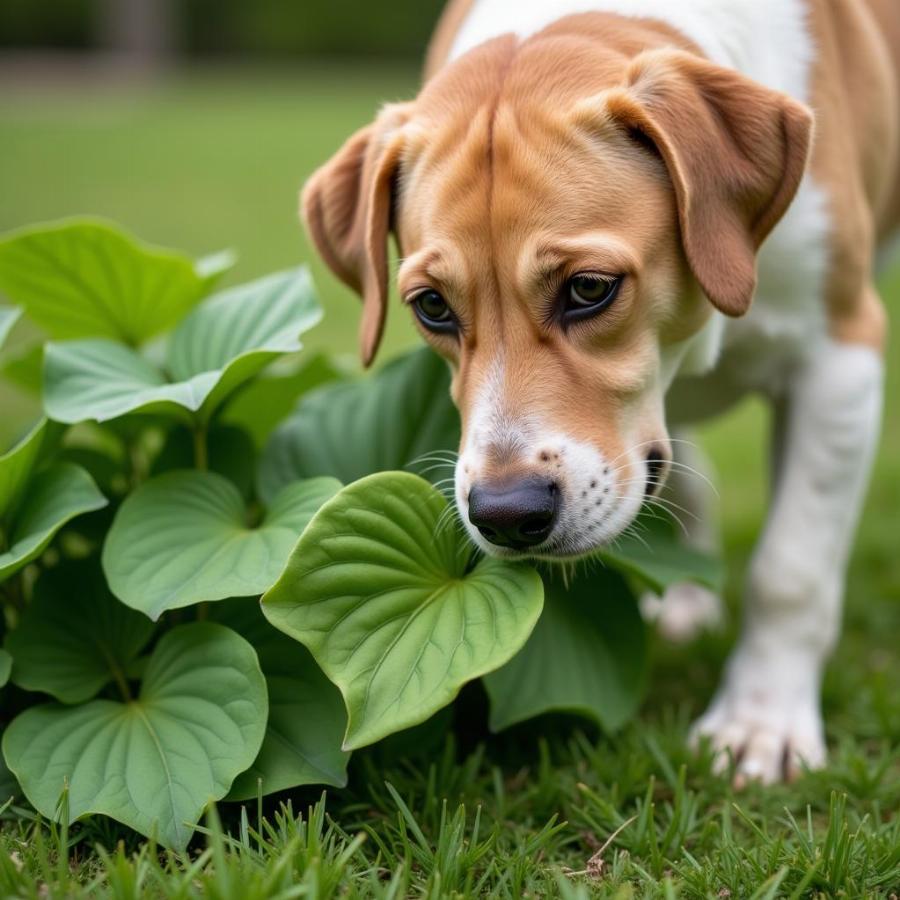Hostas are popular perennials, prized for their lush foliage and shade tolerance. But if you’re a dog owner, you need to be aware of the potential dangers these plants pose. Hostas contain saponins, which are toxic to dogs and can cause a range of unpleasant symptoms if ingested. This article will delve into the toxicity of hostas, the signs of hosta poisoning in dogs, and how to keep your furry friend safe.
Understanding the Toxicity of Hostas to Dogs
All parts of the hosta plant are toxic to dogs due to the presence of saponins. Saponins act as a natural defense mechanism for the plant, but they can cause gastrointestinal upset and other issues in dogs. While not usually fatal, hosta ingestion can lead to significant discomfort and require veterinary intervention. The severity of the reaction depends on the amount of hosta consumed and the size of your dog. Smaller dogs are naturally more susceptible to the effects of toxins.
 Dog eating hosta plant
Dog eating hosta plant
Recognizing the Signs of Hosta Poisoning in Dogs
If your dog has ingested hosta, you might notice several symptoms, ranging from mild to severe. Common signs include vomiting, diarrhea, abdominal pain, loss of appetite, and depression. In more severe cases, your dog might exhibit excessive drooling, weakness, and difficulty breathing. If you suspect your dog has eaten hosta, it’s crucial to seek veterinary attention immediately.
What to Do If Your Dog Eats Hosta
Time is of the essence when dealing with potential poisoning. If you see your dog eating a hosta, or if they exhibit any of the symptoms mentioned above, contact your veterinarian or an emergency animal hospital right away. The sooner you seek help, the better the prognosis for your dog. Bring a sample of the hosta plant with you, if possible, to help the veterinarian with their diagnosis.
Preventing Hosta Poisoning in Dogs
Prevention is always the best approach. The most effective way to protect your dog from hosta poisoning is to remove the plants from your garden entirely. If that’s not feasible, consider fencing off the area where hostas are planted, or using deterrents to keep your dog away. Train your dog to “leave it” when they approach potentially harmful plants. This command can be invaluable in protecting your dog from a variety of dangers, not just hostas.
Creating a Dog-Friendly Garden
Creating a safe and stimulating outdoor space for your dog doesn’t mean sacrificing beauty. Many dog-friendly alternatives to hostas exist, such as ferns, sunflowers, and zinnias. shade for dogs can be provided by dog-safe trees and shrubs. Researching plants before introducing them to your garden is essential to ensure they won’t harm your furry companion.
Conclusion
Hostas, while visually appealing, can be a hidden danger for dogs. By understanding the risks, recognizing the signs of poisoning, and taking preventative measures, you can keep your canine companion safe and happy. Remember, immediate veterinary attention is crucial if you suspect your dog has ingested hosta. A dog-friendly garden is entirely possible with a little planning and awareness.
FAQ
-
Are all varieties of hostas poisonous to dogs? Yes, all parts of all hosta varieties are toxic to dogs.
-
Can hosta poisoning be fatal to dogs? While rare, hosta poisoning can be fatal, especially in small dogs or if a large amount is ingested.
-
What is the treatment for hosta poisoning in dogs? Treatment typically involves inducing vomiting, administering activated charcoal, and providing supportive care like fluids and medications to manage symptoms.
-
How long does it take for hosta poisoning symptoms to appear? Symptoms can appear within a few hours of ingestion.
-
Are there any dog-friendly alternatives to hostas? Yes, many non-toxic plants can be used in landscaping, such as sunflowers, zinnias, and certain ferns.
Dr. Emily Carter, DVM, a renowned veterinarian specializing in canine toxicology, emphasizes, “Early intervention is key in cases of hosta poisoning. The sooner treatment is initiated, the better the outcome for the pet.”
Dr. David Miller, DVM, a seasoned veterinarian with years of experience, adds, “Educating pet owners about the potential dangers of common garden plants like hostas is crucial for preventing accidental poisoning.”
Beaut Dogs is your one-stop resource for all things canine. We provide expert advice and reliable information on dog breeds, care, training, and health. For personalized guidance on creating a safe and enriching environment for your furry friend, please contact us via Email: [email protected]. Beaut Dogs is committed to helping you navigate the world of dog ownership with confidence and joy.